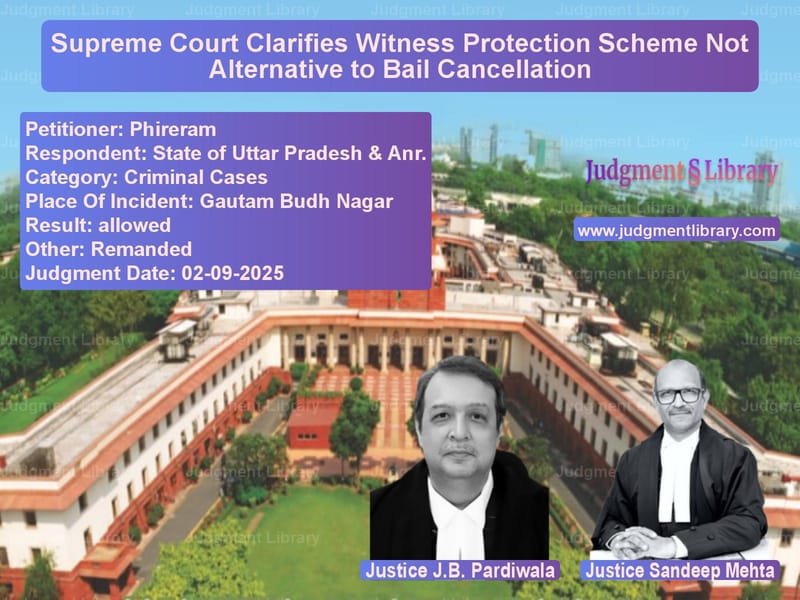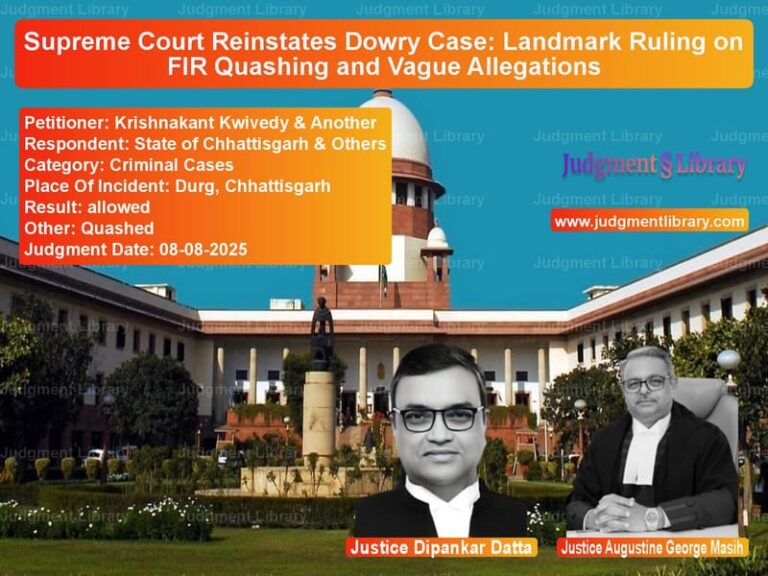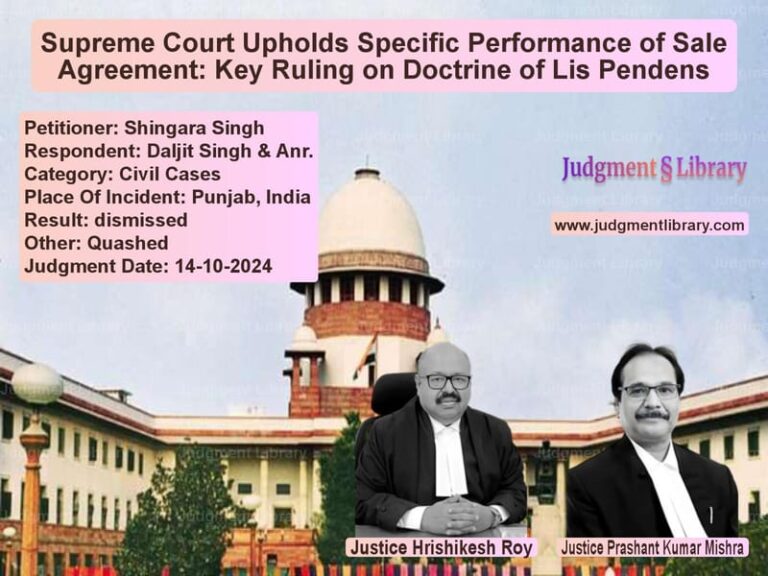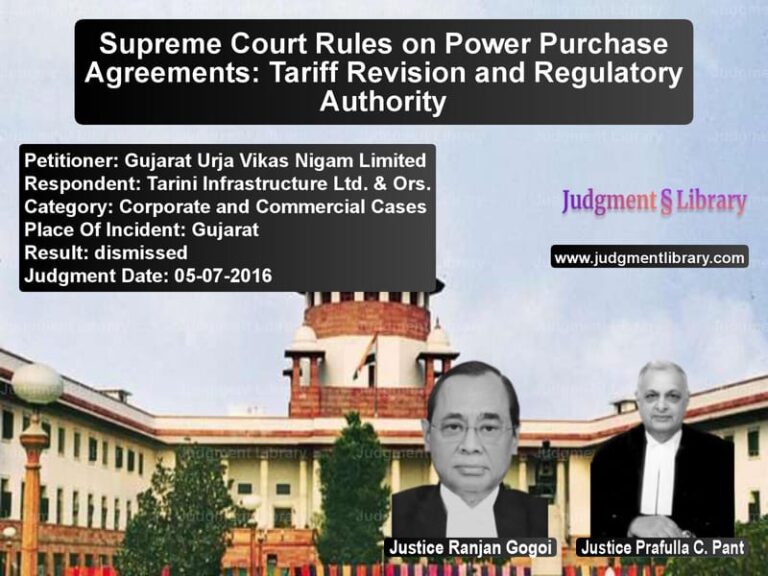Supreme Court Clarifies Witness Protection Scheme Not Alternative to Bail Cancellation
In a landmark judgment that clarifies the crucial distinction between witness protection and bail cancellation, the Supreme Court of India has delivered a significant ruling that addresses a concerning trend in the Allahabad High Court. The case, decided on September 2, 2025, revolves around a murder case where the accused, after being granted bail, allegedly began threatening witnesses, leading to the complainant seeking cancellation of bail. However, the High Court took an unusual approach by directing the complainant to seek protection under the Witness Protection Scheme instead of addressing the bail cancellation application on its merits.
The case originated from FIR No. 137 of 2022 registered at Surajpur Police Station in Gautam Budh Nagar, Uttar Pradesh, for offenses including murder, kidnapping, and criminal conspiracy under Sections 302, 201, 364, 120-B read with 34 of the Indian Penal Code. The accused persons were arrested and subsequently granted bail by the High Court with specific conditions, including that they would not tamper with evidence or threaten witnesses. However, according to the appellant-complainant Phireram, the accused began administering threats to witnesses, leading to the registration of two additional FIRs by witness Chahat Ram.
When the complainant approached the High Court seeking cancellation of bail under Section 439(2) of the Criminal Procedure Code, the court passed a brief order directing him to avail remedies under the Witness Protection Scheme, 2018, instead of cancelling the bail. The High Court observed that since the complainant had the right to get protection under the Witness Protection Scheme, which was approved by the Supreme Court in Mahender Chawla vs. Union of India, the bail cancellation application could be disposed of with liberty to approach the competent authority under the Scheme.
The Supreme Court’s Elaborate Analysis
The Supreme Court bench comprising Justices J.B. Pardiwala and Sandeep Mehta expressed strong disapproval of the High Court’s approach. The court noted that the State counsel had informed the High Court that the Investigating Officer had found substance in the allegations of witness intimidation. Despite this, the High Court had declined to cancel the bail, treating the Witness Protection Scheme as an alternative remedy.
The Supreme Court delivered an extensive judgment explaining the true scope and purpose of the Witness Protection Scheme, 2018. The court traced the legislative history of witness protection in India, noting that the concept had been discussed in various Law Commission reports since 1958. The 14th Report of the Law Commission in 1958 had already expressed concern about witness harassment and intimidation. Subsequent reports, including the 154th Report in 1996, the Malimath Committee Report in 2003, and the 198th Report in 2006, had all emphasized the pressing need for witness protection to ensure fair trials.
The court quoted from Zahira Habibullah Sheikh v. State of Gujarat: “if the witness himself is incapacitated from acting as eyes and ears of justice, the trial gets putrefied and paralysed, and it no longer can constitute a fair trial.” The judgment emphasized that criminal justice rests upon the testimony of witnesses, and without protection, witnesses cannot discharge their solemn role.
However, the court made it clear that the Witness Protection Scheme was not conceived as an alternative or substitute for the existing provisions for bail cancellation. The court observed: “The principle that individual liberty of accused and undertrial can be curtailed to ensure that his conduct does not interfere with the course of criminal justice existed even before the first report of the Law Commission in 1958.”
Distinction Between Witness Protection and Bail Cancellation
The Supreme Court drew a clear distinction between the two concepts: “There is a fine but pertinent distinction between the grant of bail and its cancellation on the ground of violation of the conditions of bail order and the affording of protection to a witness under the Scheme.”
The court explained that the Witness Protection Scheme is a “remedial and curative measure, designed to neutralise the effects of threats once they have materialised. Bail cancellation, on the other hand, is a preventive and supervisory function of the criminal court, whose very duty it is to ensure that the trial proceeds unpolluted by intimidation. The former is a positive obligation of the State, whereas the latter is judicial in nature, flowing from the inherent power of the courts to ensure that justice is done under its watch.”
The court strongly criticized the notion that the Witness Protection Scheme could be a substitute for bail cancellation: “The existence of a Witness Protection Scheme can by no stretch be a consideration to decline to cancel the bail, even when there is prima facie material indicating that the accused administered threats or caused intimidation to the witnesses. To substitute one for the other is to denude the court of its authority and render the provisions of bail cancellation otiose and thereby make a mockery of the conditions imposed while granting bail.”
Principles Governing Bail Cancellation
The Supreme Court reiterated the well-settled principles governing cancellation of bail, quoting from its earlier decision in P v. State of M.P.: “Some of the circumstances where bail granted to the accused under Section 439(1) CrPC can be cancelled are enumerated below: (a) If he misuses his liberty by indulging in similar/other criminal activity; (b) If he interferes with the course of investigation; (c) If he attempts to tamper with the evidence; (d) If he attempts to influence/threaten the witnesses; (e) If he evades or attempts to evade court proceedings…”
The court emphasized that “the governing principle is that if the accused tampers with evidence, threatens witnesses, or attempts to subvert the trial, the indulgence of bail is to be withdrawn. It is a recognition that liberty is conditional, not absolute, and subject always to the larger interest of ensuring a fair trial.”
Concern About Allahabad High Court Practice
In what may be the most significant part of the judgment, the Supreme Court expressed deep concern about a practice that had developed in the Allahabad High Court. The court noted that it had come across at least forty recent orders where the High Court had passed “verbatim copy of each other” orders, treating the Witness Protection Scheme as an alternative remedy for bail cancellation.
The court stated: “We are dismayed to note that the aforesaid practice of passing cyclostyled template orders has been in vogue past more than two years. The most disturbing feature of all these orders passed is that the Public Prosecutor instead of assisting the learned Judge in the right direction by pointing out the correct position of law, has instead himself urged that the witness or complainant be relegated to avail remedy under the Witness Protection Scheme rather than seeking cancellation of the bail of the accused person.”
The Supreme Court deprecated this practice and set aside the impugned order of the High Court. The matter was remanded back to the High Court with a direction to rehear the bail cancellation application on its merits after calling for a report from the Investigating Officer about the two FIRs registered by the witness.
The court also directed the Registry to circulate copies of this judgment to all High Courts and specifically to send a copy to the Chief Justice of the Allahabad High Court. This comprehensive judgment serves as an important reminder that witness protection and bail cancellation serve different purposes in the criminal justice system and cannot be substituted for one another. The ruling reinforces the court’s duty to ensure that bail conditions are strictly enforced and that threats to witnesses are dealt with firmly through appropriate legal mechanisms, including bail cancellation when necessary.
Petitioner Name: Phireram.Respondent Name: State of Uttar Pradesh & Anr..Judgment By: Justice J.B. Pardiwala, Justice Sandeep Mehta.Place Of Incident: Gautam Budh Nagar.Judgment Date: 02-09-2025.Result: allowed.
Don’t miss out on the full details! Download the complete judgment in PDF format below and gain valuable insights instantly!
Download Judgment: phireram-vs-state-of-uttar-prade-supreme-court-of-india-judgment-dated-02-09-2025.pdf
Directly Download Judgment: Directly download this Judgment
See all petitions in Bail and Anticipatory Bail
See all petitions in Judgment by J.B. Pardiwala
See all petitions in Judgment by Sandeep Mehta
See all petitions in allowed
See all petitions in Remanded
See all petitions in supreme court of India judgments September 2025
See all petitions in 2025 judgments
See all posts in Criminal Cases Category
See all allowed petitions in Criminal Cases Category
See all Dismissed petitions in Criminal Cases Category
See all partially allowed petitions in Criminal Cases Category







